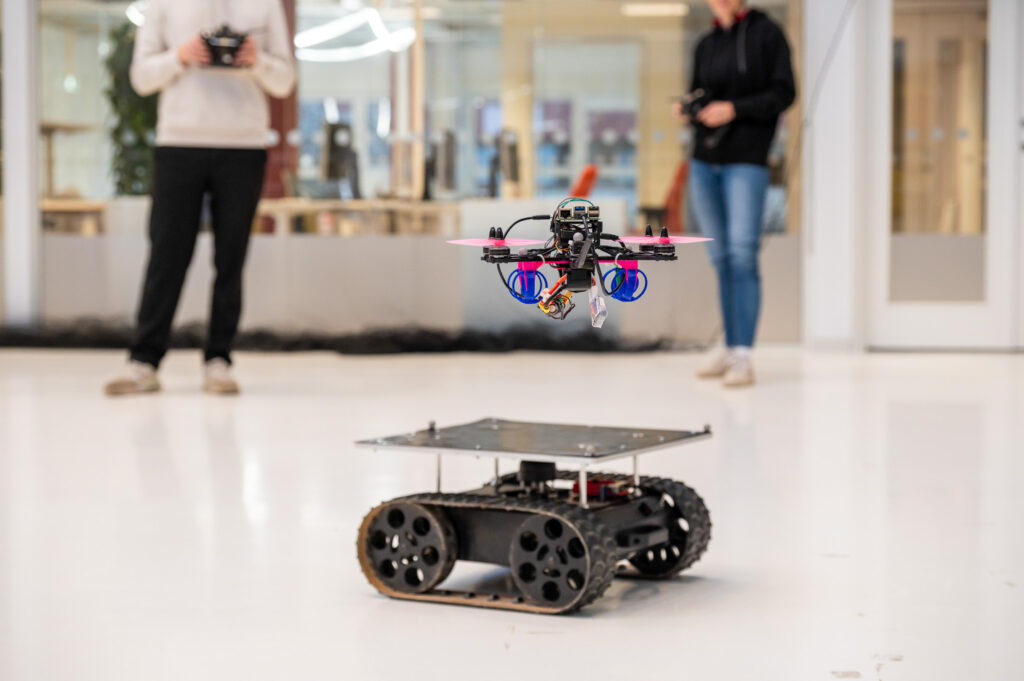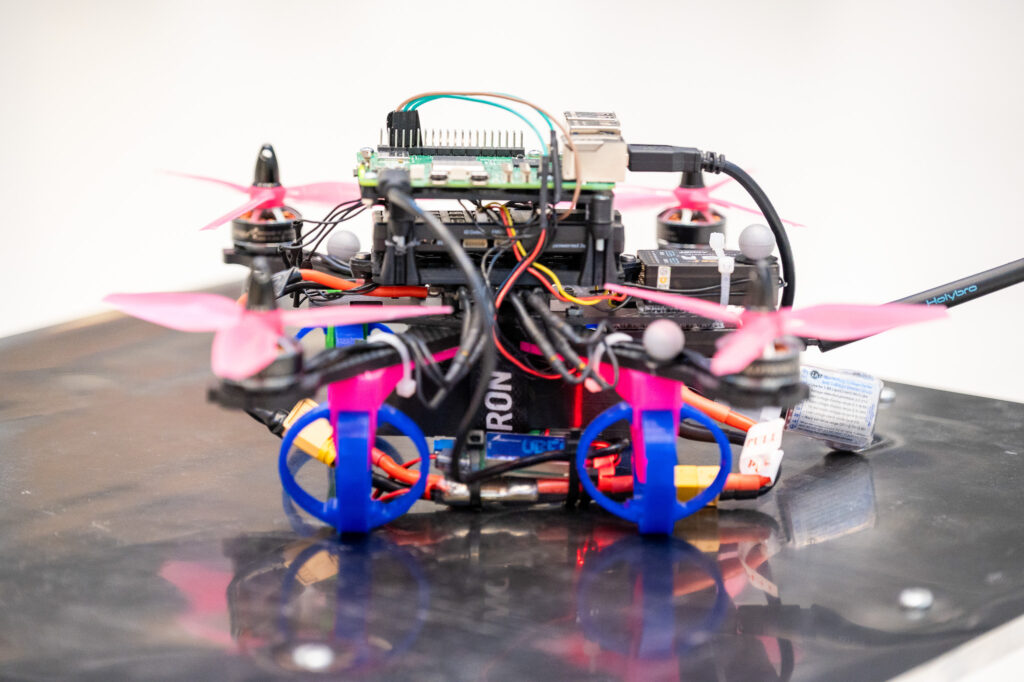Education
Theses, courses, and projects
SEDDIT has close connections to the engineering education at Linköping and Uppsala University, and the researchers in the center have strong teaching commitments. This gives excellent possibilities for knowledge transfer between the students, researchers and the industry partners in the center.
The connections between SEDDIT and the engineering education have several components, and they will be summarized here. Additional information can be given by the researchers in the center.

Master’s Theses
Each year the companies in SEDDIT offer interesting and challenging Master’s thesis tasks. Proposals for Master’s theses are normally posted on the websites of the companies. In addition, the researchers in SEDDIT have very good contacts with companies also outside the center.
For more information about Master’s theses contact Johan Löfberg (johan.lofberg@liu.se), Lars Eriksson (lars.eriksson@liu.se), or the other researchers in the center.
Examples of Master’s theses carried out within SEDDIT
Data-Driven Diagnosis For Fuel Injectors Of Diesel Engines In Heavy-Duty Trucks
The aim of this work was to develop methods for detecting faults in the injectors of diesel engines to ensure optimal performance and compliance with the legal requirements. Data-driven residuals combined with the CUSUM algorithm, and the Random Forest classifier respectively were evaluated. Both approaches showed promising capability to detect faulty injectors. The work was carried out at Scania CV.
Simultaneous Aircraft Localization and Mapping using Signals of Opportunity and Inverse Depth Parametrization
Global Navigation Satellite Systems (GNSS) is a vital component in many systems for localization. There are situations when the GNSS signal is unavailable due to jamming, physical obstacles, or technical failures. The task in this work has been to study and evaluate how Signals of Opportunity (SOP) can replace GNSS in such situations, considering aspects, such as, signal quality and availability. The work was carried out at Saab Aeronautics.
Master’s Level Courses
The divisions offer several courses with strong relevance for the scope of SEDDIT, and some examples you can find here.
Additional information can be given by the Director of Studies Johan Löfberg (johan.lofberg@liu.se) or Jan Sundberg (jan.sundberg@angstrom.uu.se).
Sensor fusion
Sensor Fusion is all about how to extract information from available sensors. The basis for this is estimation and filtering theory from statistics. Examples and applications studied focus on localization, either of the sensor platform (navigation) or other mobile objects (target tracking).
As an engineer with knowledge in sensor fusion you are very attractive on the work market. Each year we host numerous Master’s Thesis projects with students working at companies. The content of this course is inspired by the more than 150 Master’s Theses that we have examined the last few years.
By attending this course you will obtain a solid ground to stand on, which covers everything from the mathematical fundamentals to applications. You will get the chance to learn both how to approach problems from a theoretical point of view and solving practical problems in matlab . Laboratory exercises and computer exercises are central in the course, and you get to use a computer during the exam.
Modelling and learning for dynamical systems
This course is focused on methods and principles for constructing mathematical models of dynamic systems, both using first principles and data-driven methods, and about how properties of the models can be studied through simulation.
Optimal control
Optimal control consists of theory and methods for controlling dynamical systems so that a mathematical criterion is minimized. The course aims at giving basic theory and engineering oriented computational methods in the area. After taking the course the participants are expected to be able to:
- Analyze and synthesize optimal open loop control signals using the Maximum principle.
- Analyze and synthesize optimal feedback laws using Dynamic Programming and Reinforcement Learning.
- Use numerical software to solve optimal control problems.
- Describe the connections between optimal control and other optimization approaches.
Autonomous vehicles – planning, control, and learning systems
Currently, an enormous interest in autonomous vehicles both within academia and industry, with applications for example in self-driving cars and trucks, and unmanned aerial vehicles. This course provides the theoretical and technological basis for how such systems work, and in particular covers algorithms and tools for planning, control, and learning in autonomous vehicles. An autonomous system often consists of components for planning, control, and learning and the interaction between these is studied from a system perspective with a strong implementation focus.
Vehicle Propulsion Systems
This course treats the longitudinal behavior of road vehicles and gives a framework for analyzing and optimizing the energy consumption. Both traditional and new hybrid powertrain configurations are treated. Realistic mathematical models are developed for the components and they are compiled to complete vehicle systems that are analyzed and used to develop optimized energy management strategies.
Several case studies are used to exemplify the methodology and show the principles and challenges associated with analyzing and optimizing complex powertrains.
Modelling and control of engines and drivelines
Course description only in Swedish
Kursen består av en teoridel och en projektdel som examineras med obligatoriska förberedelseuppgifter och inlämningsuppgifter. Kursen avslutas med en tenta för den som vill ha betyg 4 eller 5. Observera följande punkter som gäller för projekten och som finns närmare beskrivna i laborationskompendiet.
- Projekt 1 består av 3 inlämningar och det krävs att en förberedelseuppgift samt två projektredogörelser lämnas in och godkänns. Motormätningen i motorlabbet är obligatorisk och spearata anmälningslistor sätts upp.
- En modellbeskrivning och experimentplan skall lämnas in och godkännas innan motormätningarna i projekt 1, se deadline nedan.
- Projekt 2 består av 2 inlämningar och projekt 2A rapporten skall vara godkänd innan projekt 2B rapporten skickas in.
- Projekt 3 skall en förberedelseuppgift och en projektredogörelse lämnas in och godkännas. Förberedelsuppgiften skall vara godkänd innan salstillfället.
Fault detection and diagnosis of technical systems
Course description only in Swedish
Målet med kursen är att ge både en teoretisk och en praktisk grund för hur man konstruerar automatiska system (diagnossystem) för detektering och isolering av fel i tekniska processer. Kursen ska ge kunskaper i hur man kan använda matematiska modeller av tekniska processer för att konstruera och analysera diagnossystem.
Summer Projects
SEDDIT arranges summer projects for students in collaboration with some of the companies in the center. The companies propose tasks suitable for six weeks of work for students, and SEDDIT hires students with suitable background to work on the proposed tasks. The projects are documented via posters which are presented at the annual workshops of SEDDIT. Further information can be given by the Center Director Svante Gunnarsson (svante.gunnarsson@liu.se).

